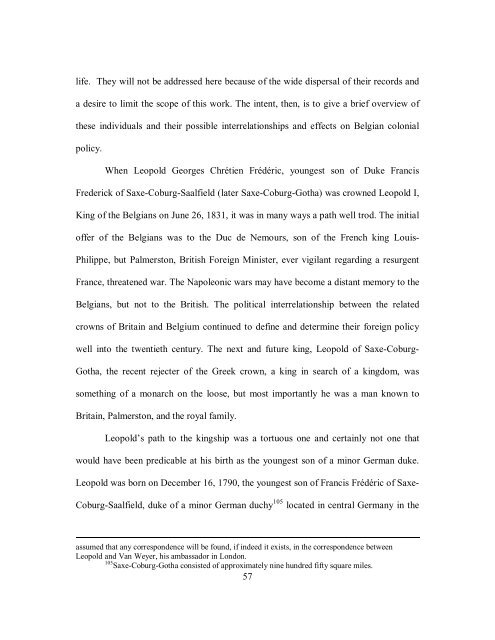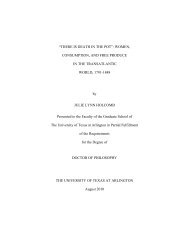EARLY BELGIAN COLONIAL EFFORTS - The University of Texas at ...
EARLY BELGIAN COLONIAL EFFORTS - The University of Texas at ...
EARLY BELGIAN COLONIAL EFFORTS - The University of Texas at ...
Create successful ePaper yourself
Turn your PDF publications into a flip-book with our unique Google optimized e-Paper software.
life. <strong>The</strong>y will not be addressed here because <strong>of</strong> the wide dispersal <strong>of</strong> their records and<br />
a desire to limit the scope <strong>of</strong> this work. <strong>The</strong> intent, then, is to give a brief overview <strong>of</strong><br />
these individuals and their possible interrel<strong>at</strong>ionships and effects on Belgian colonial<br />
policy.<br />
When Leopold Georges Chrétien Frédéric, youngest son <strong>of</strong> Duke Francis<br />
Frederick <strong>of</strong> Saxe-Coburg-Saalfield (l<strong>at</strong>er Saxe-Coburg-Gotha) was crowned Leopold I,<br />
King <strong>of</strong> the Belgians on June 26, 1831, it was in many ways a p<strong>at</strong>h well trod. <strong>The</strong> initial<br />
<strong>of</strong>fer <strong>of</strong> the Belgians was to the Duc de Nemours, son <strong>of</strong> the French king Louis-<br />
Philippe, but Palmerston, British Foreign Minister, ever vigilant regarding a resurgent<br />
France, thre<strong>at</strong>ened war. <strong>The</strong> Napoleonic wars may have become a distant memory to the<br />
Belgians, but not to the British. <strong>The</strong> political interrel<strong>at</strong>ionship between the rel<strong>at</strong>ed<br />
crowns <strong>of</strong> Britain and Belgium continued to define and determine their foreign policy<br />
well into the twentieth century. <strong>The</strong> next and future king, Leopold <strong>of</strong> Saxe-Coburg-<br />
Gotha, the recent rejecter <strong>of</strong> the Greek crown, a king in search <strong>of</strong> a kingdom, was<br />
something <strong>of</strong> a monarch on the loose, but most importantly he was a man known to<br />
Britain, Palmerston, and the royal family.<br />
Leopold’s p<strong>at</strong>h to the kingship was a tortuous one and certainly not one th<strong>at</strong><br />
would have been predicable <strong>at</strong> his birth as the youngest son <strong>of</strong> a minor German duke.<br />
Leopold was born on December 16, 1790, the youngest son <strong>of</strong> Francis Frédéric <strong>of</strong> Saxe-<br />
Coburg-Saalfield, duke <strong>of</strong> a minor German duchy 105 loc<strong>at</strong>ed in central Germany in the<br />
assumed th<strong>at</strong> any correspondence will be found, if indeed it exists, in the correspondence between<br />
Leopold and Van Weyer, his ambassador in London.<br />
105<br />
Saxe-Coburg-Gotha consisted <strong>of</strong> approxim<strong>at</strong>ely nine hundred fifty square miles.<br />
57
















